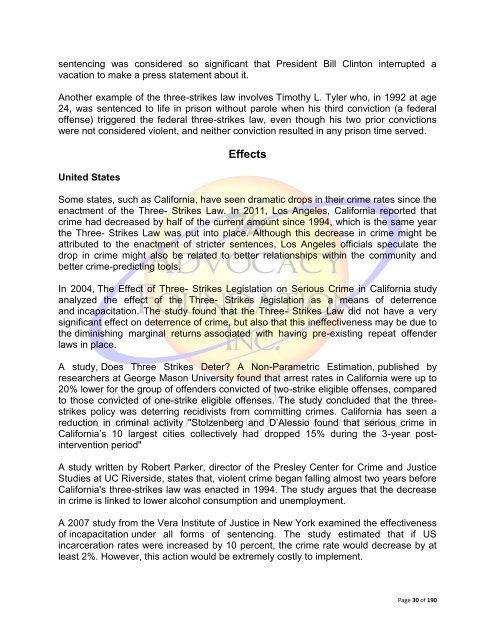The Violent Crime and Law Enforcement Act of 1994
The Violent Crime and Law Enforcement Act of 1994
The Violent Crime and Law Enforcement Act of 1994
Create successful ePaper yourself
Turn your PDF publications into a flip-book with our unique Google optimized e-Paper software.
sentencing was considered so significant that President Bill Clinton interrupted a<br />
vacation to make a press statement about it.<br />
Another example <strong>of</strong> the three-strikes law involves Timothy L. Tyler who, in 1992 at age<br />
24, was sentenced to life in prison without parole when his third conviction (a federal<br />
<strong>of</strong>fense) triggered the federal three-strikes law, even though his two prior convictions<br />
were not considered violent, <strong>and</strong> neither conviction resulted in any prison time served.<br />
United States<br />
Effects<br />
Some states, such as California, have seen dramatic drops in their crime rates since the<br />
enactment <strong>of</strong> the Three- Strikes <strong>Law</strong>. In 2011, Los Angeles, California reported that<br />
crime had decreased by half <strong>of</strong> the current amount since <strong>1994</strong>, which is the same year<br />
the Three- Strikes <strong>Law</strong> was put into place. Although this decrease in crime might be<br />
attributed to the enactment <strong>of</strong> stricter sentences, Los Angeles <strong>of</strong>ficials speculate the<br />
drop in crime might also be related to better relationships within the community <strong>and</strong><br />
better crime-predicting tools.<br />
In 2004, <strong>The</strong> Effect <strong>of</strong> Three- Strikes Legislation on Serious <strong>Crime</strong> in California study<br />
analyzed the effect <strong>of</strong> the Three- Strikes legislation as a means <strong>of</strong> deterrence<br />
<strong>and</strong> incapacitation. <strong>The</strong> study found that the Three- Strikes <strong>Law</strong> did not have a very<br />
significant effect on deterrence <strong>of</strong> crime, but also that this ineffectiveness may be due to<br />
the diminishing marginal returns associated with having pre-existing repeat <strong>of</strong>fender<br />
laws in place.<br />
A study, Does Three Strikes Deter? A Non-Parametric Estimation, published by<br />
researchers at George Mason University found that arrest rates in California were up to<br />
20% lower for the group <strong>of</strong> <strong>of</strong>fenders convicted <strong>of</strong> two-strike eligible <strong>of</strong>fenses, compared<br />
to those convicted <strong>of</strong> one-strike eligible <strong>of</strong>fenses. <strong>The</strong> study concluded that the threestrikes<br />
policy was deterring recidivists from committing crimes. California has seen a<br />
reduction in criminal activity "Stolzenberg <strong>and</strong> D’Alessio found that serious crime in<br />
California’s 10 largest cities collectively had dropped 15% during the 3-year postintervention<br />
period"<br />
A study written by Robert Parker, director <strong>of</strong> the Presley Center for <strong>Crime</strong> <strong>and</strong> Justice<br />
Studies at UC Riverside, states that, violent crime began falling almost two years before<br />
California's three-strikes law was enacted in <strong>1994</strong>. <strong>The</strong> study argues that the decrease<br />
in crime is linked to lower alcohol consumption <strong>and</strong> unemployment.<br />
A 2007 study from the Vera Institute <strong>of</strong> Justice in New York examined the effectiveness<br />
<strong>of</strong> incapacitation under all forms <strong>of</strong> sentencing. <strong>The</strong> study estimated that if US<br />
incarceration rates were increased by 10 percent, the crime rate would decrease by at<br />
least 2%. However, this action would be extremely costly to implement.<br />
Page 30 <strong>of</strong> 190
















